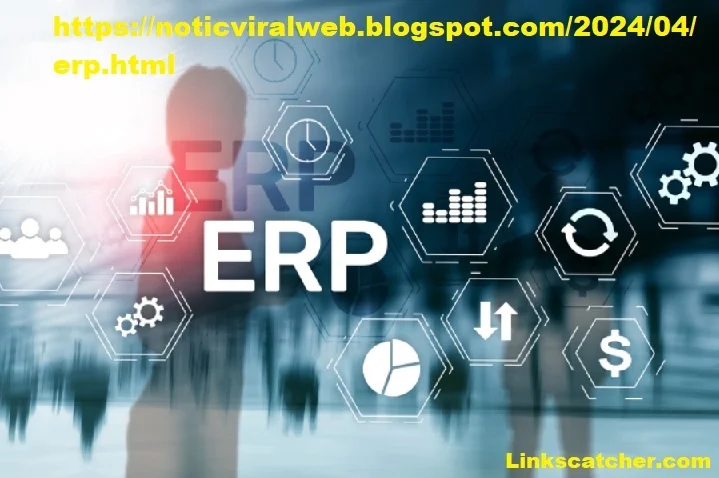
In today’s fast-paced business world, companies are constantly seeking ways to https://noticviralweb.blogspot.com/2024/04/erp.html streamline operations and enhance productivity. Enter ERP (Enterprise Resource Planning) systems—the game-changers that integrate various functions into a unified platform. But implementing an ERP system can feel overwhelming without the right guidance. This guide will provide you with essential insights for a successful implementation journey, ensuring your organization reaps all the benefits of this powerful tool. Let’s dive in and unlock the potential of ERP together!
Introduction of https://noticviralweb.blogspot.com/2024/04/erp.html
Enterprise Resource Planning (ERP) https://noticviralweb.blogspot.com/2024/04/erp.html systems streamline business processes by integrating various functions into a single platform. They enhance collaboration, improve data accuracy, and enable better decision-making across departments. As organizations grow, the need for an efficient ERP system becomes crucial to maintain competitiveness and drive success in today’s fast-paced market environment.
What is ERP?
Enterprise Resource Planning (ERP) https://noticviralweb.blogspot.com/2024/04/erp.html is a software solution that integrates various business processes into one unified system. It streamlines operations, enhances data flow, and improves overall efficiency. By centralizing information across departments, ERP helps organizations manage resources more effectively, from finance to supply chain management. This leads to smarter decisions and smoother workflows.
Benefits of https://noticviralweb.blogspot.com/2024/04/erp.html
Implementing an ERP system streamlines your business processes, leading to enhanced efficiency. It boosts decision-making through real-time data insights and offers significant cost savings over time. Additionally, ERP systems are scalable, allowing businesses to grow without the constant need for new software solutions. This flexibility supports long-term strategic planning and operational growth.
· Enhanced Efficiency
Enhanced efficiency is one of the most significant advantages of ERP systems. By streamlining processes and automating routine tasks, businesses can reduce manual errors and save time. This leads to faster operations and better resource management, allowing employees to focus on more strategic initiatives that drive growth and innovation within the organization.
· Improved Decision-Making
With an ERP system, organizations gain access to real-time data and analytics. This transparency boosts confidence in decision-making processes. Teams can analyze trends, assess performance metrics, and respond quickly to market changes. Enhanced visibility enables leaders to make informed choices that drive growth and efficiency while minimizing risks associated with uncertainty.
· Cost Savings
Implementing an ERP https://noticviralweb.blogspot.com/2024/04/erp.html system can lead to significant cost savings. By streamlining processes, reducing manual tasks, and minimizing errors, businesses can lower operational expenses. Additionally, improved inventory management helps avoid overstocking or stock outs, further enhancing financial efficiency. These factors contribute to a healthier bottom line and increased profitability for the organization.
· Scalability
Scalability is a crucial aspect of ERP https://noticviralweb.blogspot.com/2024/04/erp.html systems. As your business grows, an effective ERP can adapt seamlessly to increased demands. This flexibility allows organizations to add users, modules, or functionality without significant disruptions. With the right system in place, companies can scale operations efficiently and sustain growth over time.
Tips for Implementing ERP
Defining clear objectives helps guide the ERP implementation process. Choose a system that aligns with your business needs. Involve key stakeholders early to foster buy-in. Plan resources wisely for smooth execution. Testing is crucial; ensure everything works before going live. Monitor progress and adjust as needed to stay on track.
· Define Clear Objectives
Defining clear objectives is crucial for a successful ERP implementation. Identify what you want to achieve, whether it’s streamlining processes or improving data accuracy. Set measurable goals that align with your business strategy. Communicate these objectives to all stakeholders to ensure everyone understands the project’s direction and purpose from the outset.
· Choose the Right ERP System
Selecting the right ERP system https://noticviralweb.blogspot.com/2024/04/erp.html is crucial for success. Start by assessing your business needs and processes. Consider scalability, usability, and integration capabilities with existing tools. Research vendors thoroughly, examining reviews and case studies. A demo can provide insights into functionality. Prioritize systems that align with your goals to enhance productivity efficiently.
· Involve Key Stakeholders
Engaging key stakeholders is crucial for successful ERP implementation. Involve department heads, users, and IT staff early in the process. Their insights will help identify needs and potential challenges. By fostering collaboration, you build a sense of ownership that drives adoption and ultimately leads to smoother transitions and better outcomes across the organization.
· Plan and Allocate Resources
Resource planning is crucial for ERP success. Identify the necessary human, financial, and technological resources early on. Assign specific roles to team members and ensure everyone understands their responsibilities. Allocate a realistic budget that covers all phases of implementation, from training to software costs, ensuring your project stays on track and within scope.
· Test Thoroughly
Thorough testing is vital for a successful ERP implementation https://noticviralweb.blogspot.com/2024/04/erp.html. It helps identify bugs and integration issues early on. Engage end-users in the testing phase to gather valuable feedback. This ensures the system meets real-world needs and performs as expected under various scenarios, fostering confidence among users before going live.
· Monitor and Evaluate
Monitoring and evaluating your ERP implementation is crucial. Regularly assess system performance and user feedback to identify issues early. Use analytics tools for insights into processes and productivity. Adapt strategies based on findings, ensuring continuous improvement. Engaging with teams during this phase fosters a culture of accountability and transparency, enhancing overall effectiveness.
Common ERP Modules

Common ERP modules https://noticviralweb.blogspot.com/2024/04/erp.html include finance, human resources, supply chain management, and customer relationship management. Each module addresses specific business needs, allowing for streamlined processes and improved collaboration across departments. Organizations can tailor these modules to fit their operational requirements, ensuring a cohesive approach to managing resources and enhancing productivity throughout the enterprise.
Challenges of ERP Implementation
Implementing ERP systems https://noticviralweb.blogspot.com/2024/04/erp.html can be daunting. Organizations often face resistance to change from employees who are accustomed to existing processes. Additionally, data migration issues may arise, complicating integration efforts. Customizing the system for specific needs can further strain resources and delay project timelines, posing significant challenges throughout the implementation journey.
· Resistance to Change
Resistance to change is a common hurdle in ERP implementation. Employees may feel threatened by new systems and processes, fearing job loss or increased workload. Addressing these concerns early on encourages buy-in. providing training and support fosters a culture of adaptability, ultimately leading to smoother transitions and better overall outcomes for the organization.
· Data Migration Issues
Data migration issues often arise during ERP implementation https://noticviralweb.blogspot.com/2024/04/erp.html. Organizations may face challenges with data quality, format inconsistencies, or loss of critical information. Ensuring accurate and complete data transfer is essential for system functionality. Investing time in proper planning and testing can help mitigate these risks, leading to a smoother transition to the new ERP system.
· Customization and Integration
Customization and integration are crucial for ERP success. Tailoring the system to fit unique business processes enhances functionality. However, excessive customization can lead to complications during updates or integrations with other software. Striking a balance ensures that the ERP system meets business needs while remaining flexible enough for future growth and advancements in technology.
Case Study: Successful ERP Implementation
A well-known manufacturing company faced operational chaos before implementing an ERP system. After careful planning and stakeholder involvement, they integrated their processes seamlessly. The result? A 30% increase in productivity and significant cost savings within the first year. Their experience highlights the transformative potential of a strategic ERP approach tailored to specific business needs.
Additional Measures for Success
Engaging in continuous training is vital. Ensure your team understands the ERP system https://noticviralweb.blogspot.com/2024/04/erp.html fully. Regularly collect feedback to address any concerns early on. Establish a dedicated support team for ongoing assistance and foster an environment that embraces change. This proactive approach can significantly enhance user adoption and overall success in your ERP journey.
Additional Tips for ERP Implementation
Engage your team early. Their insights can shape a smoother transition. Schedule regular check-ins to address concerns promptly. Invest in training sessions tailored to different user levels for better adoption. Leverage vendor support during the rollout; they offer valuable expertise that can ease challenges and enhance user experience throughout the implementation phase.
The Future of ERP Systems
The future of ERP systems https://noticviralweb.blogspot.com/2024/04/erp.html is set to evolve with AI and machine learning integration, enhancing automation and decision-making. Cloud-based solutions will become standard, offering flexibility and scalability. Additionally, businesses will increasingly prioritize user experience, ensuring interfaces are intuitive. Real-time data analytics will empower organizations to respond swiftly to market changes.
Conclusion: FAQs
ERP systems https://noticviralweb.blogspot.com/2024/04/erp.html can seem complex. Addressing common questions helps clarify their value. Users often wonder about implementation timelines, costs, and ongoing support. Understanding these aspects can ease concerns and foster confidence in choosing the right ERP solution for your business needs. Always seek expert advice to navigate your specific requirements effectively.
Read more articles
The world of ERP systems https://noticviralweb.blogspot.com/2024/04/erp.html is constantly evolving. To stay informed and ahead, exploring additional resources can provide valuable insights. We encourage you to dive deeper into related topics, trends, and best practices in ERP implementation. This will enhance your understanding and help ensure the success of your own initiatives.
For more expert advice and tips on various subjects, check out our collection of articles designed to keep you updated and knowledgeable. Explore new ideas that can transform your business operations today!